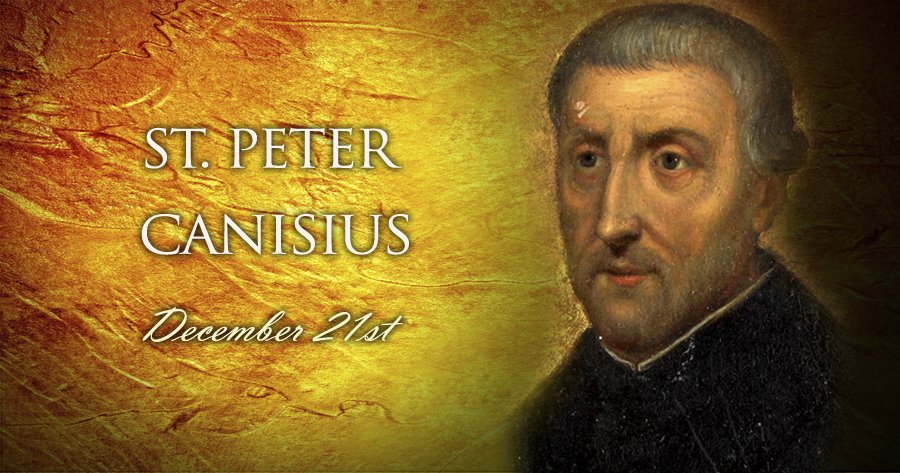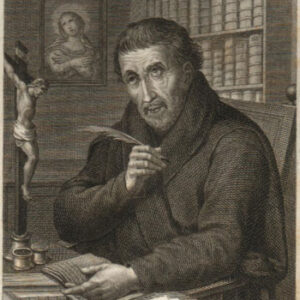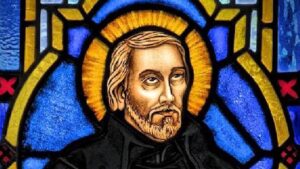
St. Peter Canisius was an intrepid Dutch Jesuit priest and a key figure in the Catholic Counter-Reformation. Peter was born in 1521 at Nijmagen, Holland to the wealthy Jacob Kanis (Canisius in English) and his wife. Jacob was the burgermeister, a role similar to mayor. Later in life, Peter wrote that as a youth, he was quarrelsome and arrogant, but he did enjoy being an altar server. He was sent to the University of Cologne at age fifteen, and there he came under the guidance of a young priest, who helped him to temper his vices and mature spiritually. Peter earned his Master’s Degree at age nineteen, and studied canon law at Louvain.
CALLED TO THE SOCIETY OF JESUS
When he was twenty-two, he attended a retreat given by Jesuit Father [St.] Peter Faber, and resolved to join the Society of Jesus, becoming the first Dutch member of the newly-formed order. He gave away his wealth to the poor and was ordained at Cologne in 1546. He was sent to participate in the Council of Trent in 1547, and attended two sessions. This ongoing ecumenical council had been convened to address the need for Church reform and to clarify the Church’s authentic teaching against the outbreak of Protestantism. He was sent to Germany to counter the spread of Protestantism in Bavaria. There he set about what was to become his life’s work. He founded the first German Jesuit colleges and became known as an effective preacher and teacher. He was instrumental in the establishment of the Jesuit method of education, establishing colleges in modern-day Germany, Austria, Switzerland, and the Czech Republic. He was assigned by the Vatican to deliver the decrees of the Council of Trent to the European bishops. This travel was dangerous in those times and places for a Catholic priest bearing many volumes of books, including the Missal, but his passion was to restore the Catholic Faith, regardless of the risk.

A CATECHISM
Father Canisius composed a Catechism in German, bringing clarity about actual Church practices and teachings to the faithful in the areas where Protestantism had introduced confusion and heresy. Such a publication was greatly needed in order to counter the exaggerations and distortions being spread by the Protestant preachers. It was eventually published in fifteen languages and had more than two hundred printings. Due to its success, he also composed two shorter Catechisms, one for adolescents and another for young children. He knew that true reform had to begin in priestly formation, and he stressed the establishment of seminaries, especially winning over Pope Gregory XIII to support this. While working to establish a university at Prague in 1556, Father Canisius was chosen to serve as Jesuit provincial for a newly-formed province which included Austria, southern Germany and Bohemia (Czech Republic). His effectiveness at preaching was not so much because he was a charismatic speaker, but rather because his message was clear and sincere. He had a shepherd’s heart, especially in looking after the needy, made especially apparent when an epidemic struck Vienna in the 1560’s, and he personally visited the stricken. He also possessed impressive diplomatic skills. While at Innsbruck, he settled a quarrel between Pope Pius IV and the Holy Roman Emperor, Maximilian II.
Father Canisius was a prolific writer, and his correspondences alone number more than twenty four hundred letters and include letters to popes, kings, bishops and such Church luminaries as Sts. Charles Borromeo, Ignatius of Loyola, Francis Borgia, and Francis de Sales. His homily notes number twelve thousand pages, consistently emphasizing the power of the Sacraments and drawing people out of lukewarmness and back to the authentic teachings of the Church. His devotion to the Virgin Mary was noteworthy, and it was he who added, “Holy Mary, Mother of God, pray for us sinners” to the Scriptural words of the Angel Gabriel and [St.] Elizabeth. He wrote two large volumes, one about the Virgin Mary, the other about St. John the Baptist.
LIFETIME LABOR OF LOVE

He passed away quietly on December 22, 1597 at Fribourg, Switzerland at age seventy-six.
St. Peter Canisius buttressed his work with fasting and with seven hours of prayer each day. He knew that harsh words and belligerence against Protestants would not accomplish the authentic reform that was needed in the Church, and he labored tirelessly to restore Catholicism by proclaiming the Truth. Because of his academic research, utilizing both Scripture and the writings of the Church Fathers, he countered the idea that Catholic beliefs are for the uneducated and the simple. In 1897, Pope Leo XIII referred to him as “the second apostle of Germany”. He was canonized and declared a Doctor of the Church in 1925. Numerous institutions are named after him and his feast day is December 21.
